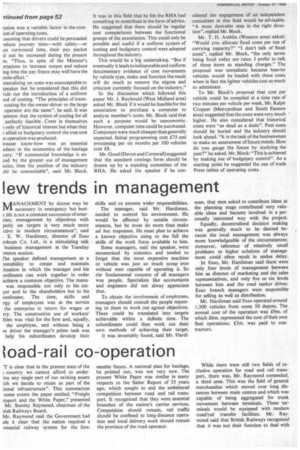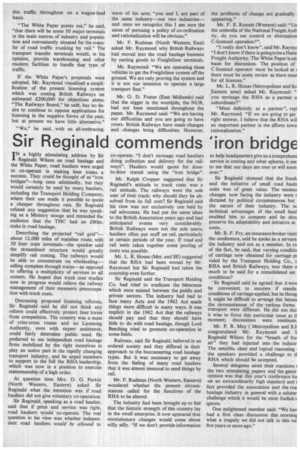toad-rail co-operation
Page 56

Page 57

If you've noticed an error in this article please click here to report it so we can fix it.
7 is clear that in the present state of the country we cannot afford to underlize any single part of our existing assets ich we decide to retain as part of the ional infrastructure". This summarizes some extent the paper entitled, "Freight nsport and the White Paper," presented Mr. Stanley Raymond, chairman of the [fish Railways Board.
Mr. Raymond said the Government had ide it clear that the nation required a Dstantial railway system for the fore seeable future. A national plan for haulage, he pointed out, was not very new. The present White Paper was similar in many respects to the Salter Report of 35 years ago, which sought to end the embittered competition between road and rail transport. It recognized that they were essential branches of the nation's carrier services. Competition should remain, rail traffic should be confined to long-distance operation and local delivery work should remain the province of the road operator. While there were still two fields of exclusive operation for road and rail transport, there was, Mr. Raymond contended, a third area. This was the field of general merchandise which moved over long distances between main centres and which was capable of being aggregated for trunk movement between terminals. These terminals would be equipped with modern road/rail transfer facilities. Mr. Raymond said that British Railways recognized that it was not their function to deal with this traffic throughout on a wagon-load basis.
"The White Paper points out," he said, "that there will be some 50 major terminals in the main centres of industry and population and conveniently situated for the transfer of road traffic trunking by rail." The transport transfer terminals would, in his opinion, provide warehousing and other modern facilities to handle that type of traffic.
If the White Paper's proposals were adopted, Mr. Raymond visualized a simplification of the present licensing system which was costing British Railways an estimated £200,000 for objections alone. "The Railways Board," he said, has no desire to continue to oppose applications for licensing in the negative forms of the past, but at present we have little alternative."
"We," he said, with an all-embracing wave of his arm, "you and I, are part of the same industry—not two industries— and once we recognize this I am sure the sense of pursuing a policy of co-ordination and rationalization will be obvious."
Mr. F. Rudman (North Western; East) asked Mr. Raymond why British Railways had moved into the road haulage business by carting goods to Freightliner terminals.
Mr. Raymond: "We are operating these vehicles to get the.Freightliner system off the ground. We are only proving the system and it is not our intention to operate a large transport fleet."
Mr. G. D. Foster (East Midlands) said that the nigger in the woodpile, the NUR, had not been mentioned throughout the paper. Mr. Raymond said: "We are having our difficulties and you are going to have yours. British Railways have made changes and changes bring difficulties. However, the problems of change are gradually appearing."
Mr. F. E. Russett (Western) said: "Un the umbrella of the National Freight At& ity, do you see control or elimination C-licensed operation?".
"I really don't know", said Mr. Raymo "I don't know if there is going to be a Natio Freight Authority. The White Paper is on] basis for discussion. The position of C-licensed operator must be looked at ; there must be some review as there musi for all licences."
Mr. L. R. House (Metropolitan and So Eastern area) asked Mr. Raymond: ." you envisage the RHA as a partner o subordinate?"
"Most definitely as a partner", repl Mr. Raymond. "If we are going to get right answer, I believe that the RHA will an important partner in the efforts towa rationalization."












































































































































